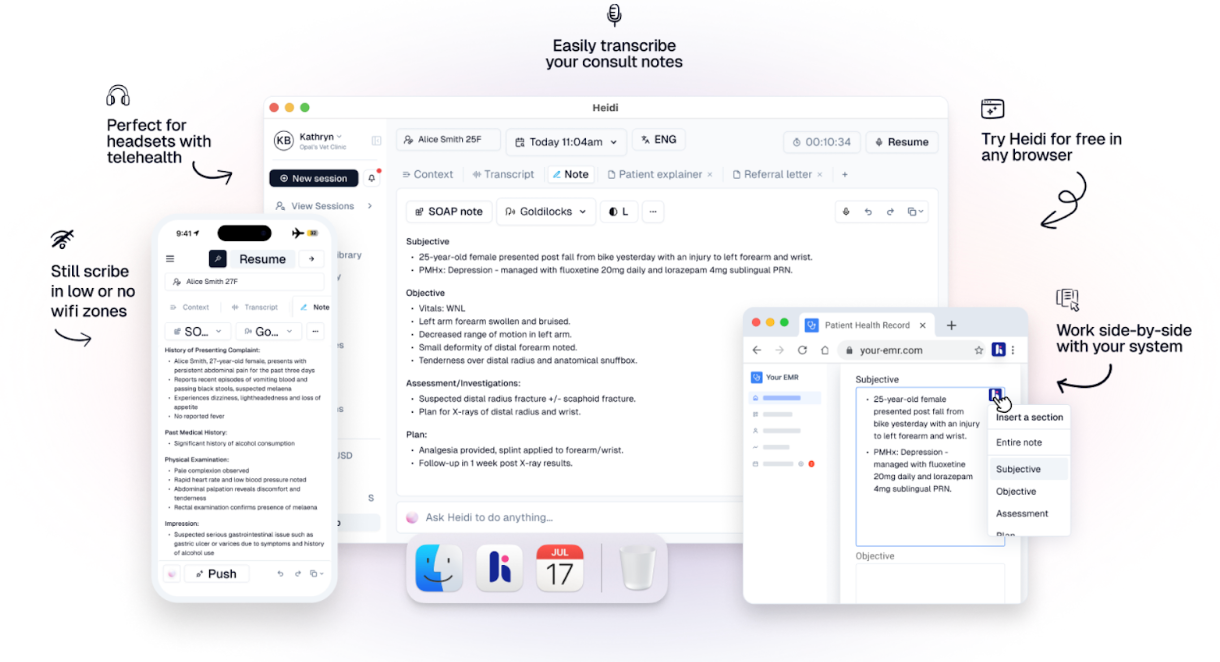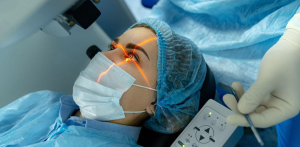Top 5 Reasons Why Heidi Is Setting the Standard for AI Medical Scribes

Healthcare is evolving rapidly, and accurate, efficient documentation has never been more critical. Traditional hand-scribing slows clinicians down, taking valuable time away from patient care and adding to administrative fatigue. Heidi, an AI medical scribe powered by advanced artificial intelligence, is changing that.
More than just AI transcription software, Heidi is a smart, adaptive clinical assistant that improves documentation accuracy, streamlines workflow, and strengthens the doctor–patient connection. It saves time and supports better outcomes on both sides of the consultation.
Here are five reasons why Heidi sets the standard for AI medical scribes today.
1. High accuracy in transcription and note generation
Accuracy in clinical documentation is essential. Even a small error in a patient’s record can affect diagnosis, treatment, and outcomes.
Heidi’s custom AI model uses machine learning to combine deidentified patient information, clinical context, and clinician preferences. This produces documentation that is not only accurate but also clinically meaningful.
By turning conversations into structured data, Heidi reduces the risk of errors and supports better clinical decisions.
It achieves low word error rates and high precision in capturing relevant medical terms. Heidi handles complex jargon and regional dialects with ease, ensuring that clinical notes remain accurate, reliable, and compliant with healthcare standards.
2. Significant time savings and efficiency
Doctors spend more than half their day updating electronic health records, which takes valuable time away from patient care. Heidi changes that by automating the note-taking process. It lets clinicians focus on the consultation instead of typing during visits or dictating afterward. This helps doctors reclaim time they can spend directly with patients.
By reducing documentation time by over 50 percent, Heidi allows clinicians to complete patient care tasks much faster. What used to take hours can now be done in minutes. It also improves overall workflow and cuts after-hours admin by up to 61 percent.
3. Better patient interactions
When doctors are focused on screens, patients often feel overlooked. This disconnect can affect the quality of care, whether in person or online.
With Heidi handling documentation in the background, doctors stay fully present. They can listen closely, ask better questions, and have real conversations.
This renewed focus strengthens trust and helps patients feel truly heard. Heidi makes it easier to bring empathy back into every consult.
It also adapts to a wide range of specialty workflows and supports over 100 languages. Whether in a busy urban hospital or a remote rural clinic, Heidi is built to meet the needs of clinicians everywhere.
4. Scalable, cost-effective for any practice
Heidi offers powerful customization and intelligent assistance to meet the needs of any clinical setting. Clinicians can tailor note templates, create reusable text snippets, and use the Ask Heidi AI assistant to instantly generate referral letters, patient summaries, and other documents. This flexibility improves documentation quality and supports a wide range of clinical workflows.
Heidi also scales effortlessly. Whether used by a solo practitioner or across an entire healthcare network, it provides consistent, AI-driven transcription without disrupting operations. Its scalable design offers a cost-effective solution for providers, helping reduce administrative overhead without compromising on accuracy or care quality.
5. Innovation built for the future
Medical documentation standards are constantly changing, and Heidi is built to keep pace. It continuously learns new medical terminology and adapts to evolving regulatory requirements, ensuring clinicians stay up to date without added effort.
Heidi is fully HIPAA-compliant and combines advanced AI with strong data protection to give healthcare providers confidence and peace of mind. It adheres to the highest international standards, including HIPAA, GDPR, SOC 2 Type II, and ISO27001 certification.
Patient data remains secure, aligned with regional regulations, and session recordings are never stored to maintain confidentiality and trust at every step.
Conclusion
Modern healthcare demands accuracy, speed, and human connection. Heidi delivers all three. It reduces documentation time, supports better care, and adapts to every clinical setting. Heidi is not just an AI medical scribe; it is the standard for what AI in healthcare should be.



